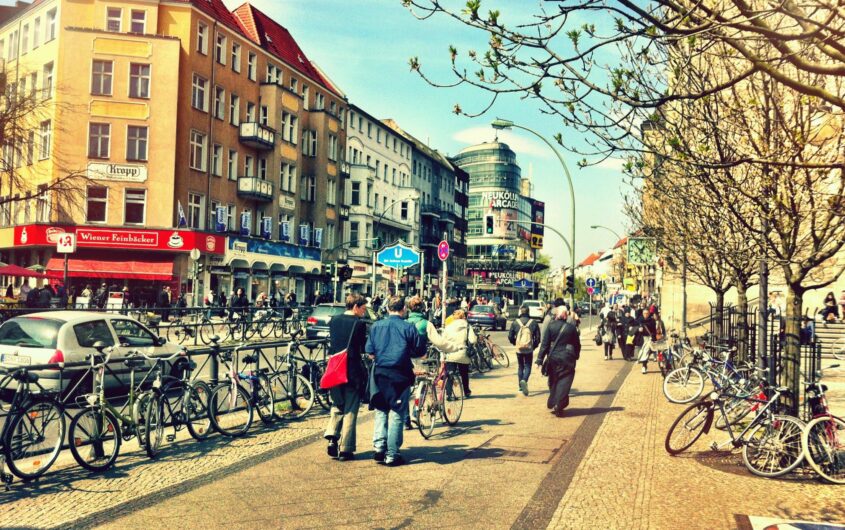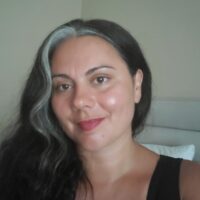
Felipe Tofani via Flickr
Holocaust Memory after Gaza

Sultan Doughan
Goldsmiths, University of London
Sultan Doughan is a lecturer (assistant professor) at Goldsmiths, University of London. She is also the Convenor of the MA Anthropology and Museum Practice. As a political anthropologist, she specialized in the secular governance of religious difference within liberal democracies in Europe. She is currently working on two book projects. A co-edited volume with Hanan Toukan titled Europe’s Question of Palestine: The Politics of Erasure and Refusal in Germany and Beyond and her monograph project tentatively titled Converting Citizens: German Secularism and the Politics of Holocaust Memory after Gaza is based on fieldwork in Germany and approaches citizenship as a practice & technology of secular conversion.
Her main concern is how debates on memory, race, and religious difference after the genocide of European Jewry generate, shape, and minoritize Middle Eastern communities as Muslim. She explores how the memory of violence inscribes state-funded educational institutions in Germany to become arbiters of injury, as such hierarchizing suffering and belonging with grave consequences for contemporary migrant communities and their access to legal and political rights. She further focuses on migrant archival practices, memorial and museum spaces for purposes of repair amidst ongoing state & police violence and the deferral of justice.
Toward a New Epistemology of the Minority Question
How does one intervene in “the Catechism Debate” when it has caused such polemics? Dirk Moses’ piece “The German Catechism” was published as an intervention into Holocaust memory debates that have increasingly constructed an “Us”—tolerant Christian Europeans/Germans—versus “Them”—religious fanatic Muslims/Arabs/Palestinians. The larger shifts enabling German politicians to mobilize Holocaust memory in the name of ensuring liberal democracy had wide-reaching consequences for citizenship, migration, ethnic, and religious minorities. What are the consequences of prescriptively constructing the Holocaust as the unique and exceptional catastrophe in modern history? How does this exceptionalizing narrative affect communities who are stateless and/or racialized religious minorities in Europe today? And, finally, how is the fact that European Jews were racialized, denaturalized from citizenship, made stateless, and ultimately deported to their death distinguished from the current treatment of migrants, who right-wing parties want to deport?
Civic education is an excellent site with which to answer these questions because it is a governmental cornerstone of post-war Germany and has previously monitored right-wing and left-wing extremism. In 2008, the category of Islamic extremism was added as a new area of extremism. In contrast to previous categorizations of extremism, this time it was not simply a political orientation that was considered extreme, but also a discursively created homogenous population called Muslim. Germany, the country from which the Holocaust was organized and coordinated, is currently home to 5.5 million people who are categorized as Muslims with varying legal status, religious affiliation, and national identification. The memory of the Holocaust has been mobilized by the Ministry of Interior to authorize German state institutions in the last two decades to govern through dialogue and integrate through pedagogies of tolerance.
The aim was to create tolerant German Muslims for a reformed Islam, but Germany in fact delayed, and still denies, Islam the legal status as a public corporation that can govern certain internal matters of faith like the two main churches in Germany. The denial of collective rights is based on the notion that Muslims are not yet sufficiently integrated and tolerant. Whereas modern Germany has been seeding a tolerant nation since Prussian times, according to the German Ministry of Interior in 2006. The crux of the matter here is that mobilizing the Holocaust in political discourse and specifically in civic education to prevent Islamic extremism was based on the notion that there is a specific Islamic antisemitism. This specific antisemitism was located in Islamic history and theology, but its main target was identified as the state of Israel, which Islamic extremists wanted to destroy. The protests in Germany correlate with each war that has been waged in Gaza or violence that erupts in Israel-Palestine and draws a larger crowd of people of various political orientations—they have been framed as symptoms of radical expressions and Israel-related antisemitism.
The right to protest has been curtailed since 2022, when predominantly youth of Palestinian descent and the Jewish Voice for Peace wanted to commemorate the Nakba, the Palestinian memory of expulsion from historical Palestine, in Berlin. According to human rights organizations, this is a clear violation of civil liberties and citizenship in a liberal democracy, but it was upheld by police orders that such protests would incite to antisemitism and cause violent behavior. In the years since, and especially since October 2023, protests in solidarity with Palestine and police violence have increased, and so have attempts to pacify the situation, including the “Antisemitism Resolution” that will more closely scrutinize the arts, culture, citizenship, and education. Intolerance as defined by the German state includes relating to the state of Israel negatively. Definitions of antisemitism in civic education have usually included the state of Israel, even before the adoption of the International Holocaust Remembrance Alliance (IHRA) definition in 2017, because Germany’s perception of Israel has been that of a Jewish homeland, its internal and occupied Palestinian population notwithstanding.
There are multiple problems with this approach. On the one hand, it applies a human rights framework of protection from (state) violence to a state. Further, it applies this frame not just to negative expressions of or against Israel, but also to pro-Palestinian speech or to claims that “Palestinian lives matter.” For example, “never again for everyone” can be claimed as hatred of Jews in Germany, because it is perceived as relativizing the Holocaust. In the current context, it can also mean accusing Israel of genocide, which has been decried as another form of hatred. These examples, which are recorded in Germany as antisemitism, trouble the notion that the Holocaust is a universal memory. Rather, they bring to the fore how the Holocaust has been constructed as a paradigmatic point of reference for other genocides. If compared at all, one needs to make sure that the Holocaust stands out and above all other genocides because of its uniqueness—Moses’ first point in his catechism argument. But perhaps most importantly, any form of Palestinian speech has been securitized as extreme, violent, and antisemitic to a level that the Palestinian memory of the Nakba (lit: catastrophe) in 1948 and its ongoing consequence of statelessness is being censored and denied in public discourse.
The practice of Holocaust memory has produced a spectacular amnesia of Jewish life, especially when it comes to how religious difference is racialized in the modern state. German political discourse retroactively projects a trajectory of tolerance toward Jews and erases the fact that before the Holocaust, European Jews were a religiously differentiated community but often lacked minority rights and were subjected to assimilation. In Germany, proud antisemites organized associations for animal rights in the 1870s to save these from the “barbaric practices” of “the Semite.” Self-proclaimed antisemites were proud and loud citizens, who could not accept that Jews should be equal to Catholics and Protestants as Germans. The racially unequal life of European Jews before the Holocaust is subdued and fits the narrative of a civilizational break that ruptured tolerant Europe in contemporary Holocaust commemorations.
The current epistemology of Holocaust memory obstructs a different approach to the topic of ethnic and religious minorities. Further, it obstructs a discussion of what citizenship could protect in a country that has industrially killed a racialized religious minority and that is racializing Muslim communities, Palestinians, and pro-Palestine solidarity as a security threat. Moreover, the epistemology of Holocaust memory has obstructed critical analytics of how racialization is constituted through secular governance of religious difference. Instead, most public accounts of Holocaust memory insist on irrational hatred of Jews and the production of race as a pseudo-science trend of the nineteenth century as opposed to an inherent problem within nation-states and nationalism.
The memory of the Holocaust has been productively embedded within this form of irrational hatred and counterposed to secular politics. In my research with civic education projects in Berlin that provided informal education to schools, museums, and other professional institutions specifically to combat Islamic extremism, antisemitism was approached as a natural feature of traditional and politically hardening Islam. I observed between 2015 and 2017 how pious Muslim and Palestinian civic educators would be particularly interesting for the organizations for their access to the intimate spaces within immigrant families and mosques. Further, they could be role models for young students who do not encounter pious Muslim educators in school due to the neutrality laws in Berlin. These organizations hired Muslims who would teach antisemitism along those lines of irrational hatred emanating specifically from religious intolerance. My interlocutors in civic education hoped that teaching about antisemitism would help them not to be discriminated against as Muslims. Further, they hoped that eventually they could find a language through teaching about antisemitism to address Islamophobia, which they were subjected to daily.
Palestinians and Muslims who dared to speak about Islamophobia, anti-Palestinian racism, or even saw resemblances in their own political situation with European Jews before the Holocaust would be ostracized as Holocaust-relativizing antisemites. Some of my interlocutors experienced character assassinations for simply daring to say that the Holocaust is a consequential history for their ancestors’ displacement from historical Palestine or their own racialization in Germany. These were individuals who deeply cared for this history and some even personally cared for actual Jewish survivors, just to be cut off from their workplaces and blacklisted by German antisemitism experts.
The current epistemology of Holocaust memory has redeemed and authorized the ethnic Christian-secularized majority to police Palestinians and Muslims and those who stand in solidarity with them, including Jews. The current epistemology of the Holocaust silences the European Jewish past in certain ways and silences German-Muslims and -Palestinians in the present as it publicly displays the Holocaust in museums and memorials. Contrary to claims in the German public that Muslims are ignorant of Holocaust history and antisemites by religion, my interlocutors in civic education were highly interested and invested in Holocaust history. For some of my research interlocutors, commemorating the Holocaust and acting responsibly did not take away from their embodied experience of other experiences of violence, including the Nakba; some even claimed that because they are Palestinian, they understand the larger historical consequences that the Holocaust has brought into the world. Their approach bore the seed for a new epistemology, one that navigates the experience of the stateless, religious minority and racialized immigrant in the past to overcome the enduring racial logic of the nation-state.







